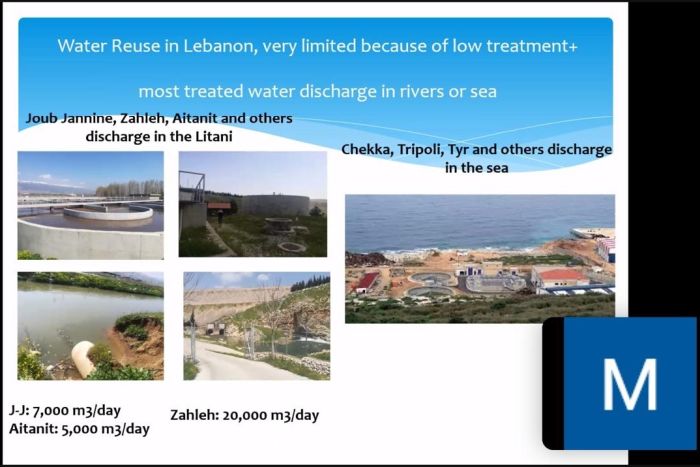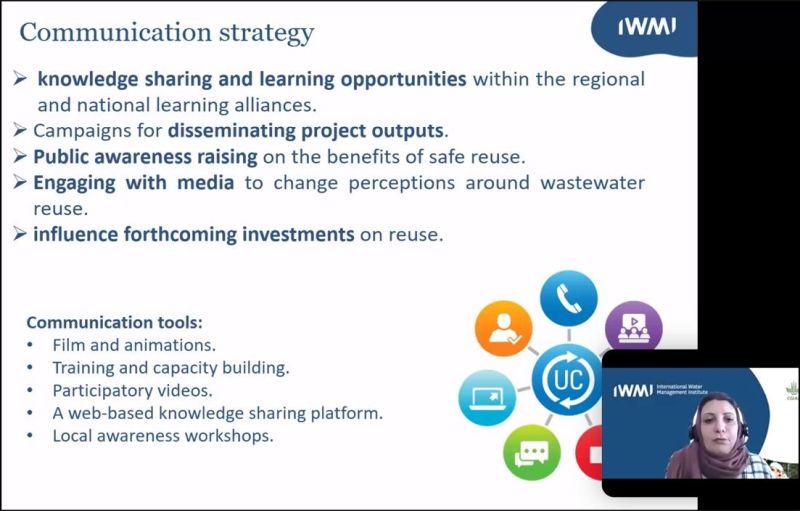Discussing the findings of the report "Analysis of Water Reuse Potential for Irrigation in Lebanon" at the 2nd National Learning Alliance (NLA) in Lebanon

On June 14th, 2021, the International Water Management Institute (IWMI), organized the 2nd ‘National Learning Alliance’ (NLA) in Lebanon in the framework of the ReWater MENA project. The meeting was organized by IWMI MENA regional office and took place online, gathering a large group of key stakeholders from the water, wastewater, and irrigation sectors in Lebanon.
The objective of the NLA was to present and discuss the main findings of the report “Analysis of Water Reuse Potential for Irrigation in Lebanon”, launched at the first NLA in October 2019. The study constitutes one the main outputs of the ReWater MENA project in Lebanon. It analyzes the needs, potential and obstacles related to reusing water in agriculture in Lebanon. As presented by the National Coordinator Dr. Marie-Helene Nassif, the work followed a participative approach where different types of national stakeholders, constituting the ‘learning alliance’ were actively engaged in defining the scope of the study, collecting data, and reviewing the report. This approach was adopted by the project to ground the research in the policy needs of water reuse development in the country and explore the topic of ‘reuse potential’ from the perspective of actors coming from different spheres (public, private, NGOs and academia), sectors (water, wastewater, irrigation, environment, and health), administrative levels and scales (national, regional, and municipal).

The report’s main findings were presented by the researcher Dr. Karim Eid Sabbagh in charge of the study. In short, the report developed a GIS national data base compiling information about the (104) actual and (164) planned wastewater treatment plants (WWTPs) in the country, as well as agricultural land use and irrigation requirements data. The first part of the report develops a technical analysis where it assigns a ‘Reuse Potential Area’ and a ‘Reuse Potential Score’ to each WWTP, taking into consideration parameters such as the plant’s treatment volume and level, surrounding agricultural land use, irrigation requirements and other anthropogenic factors. The second part of the study draws an institutional analysis and discusses the governance problems of the wastewater sector in Lebanon, underlining the main administrative, financial, technical, and socio-political obstacles that hinder the materialization of the technical reuse potential analyzed in the first part.
The presentation was followed by 4 parallel brainstorming sessions led by facilitators, where stakeholders were invited to participate in organized discussions related to the study’s findings. In the first brainstorming session, participants discussed solutions for enhancing the low capacities of the Regional Water Establishments to operate WWTPs in Lebanon, a problem that is worsening by the day with the current financial crisis in the country. The second session opened the discussion around the different problems that stand in the way of a more participatory decision-making processes in the wastewater sector and reflected on possible ways to improve it. The third session asked the participants to suggest governance organigrams for the management of reuse systems which is still to be developed in Lebanon. The fourth and last session focused on identifying risks and mitigation measures with the objective to sustain the safety of treated effluents. Following the group discussions, participants gathered altogether, and each group presented a summary of the main findings and way forward. Results will be used to validate and further documents the findings of the study.
The National Learning Alliance (NLA) is an integral part of ReWater MENA Project which uses this participatory approach to ensure effective participation of concerned stakeholders in decision making process, facilitate the exchange, co-creation, uptake and scaling-up of validated innovations and promising solutions on water reuse. The project aims to expand the safe use of treated wastewater in the Middle East and North Africa (MENA) region by addressing barriers to water reuse in the region and identifying validated reuse models.
ReWater MENA project is funded by the Swedish International Development Cooperation Agency (SIDA), and led by the International Water Management Institute (IWMI), in partnership with many entities and organizations at the local, regional and international levels.
